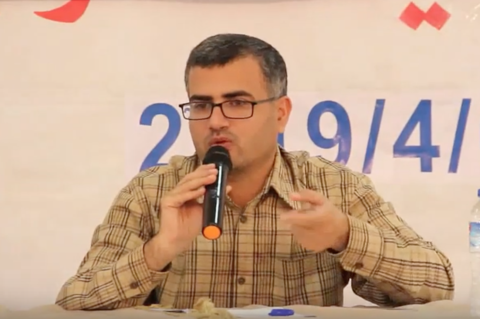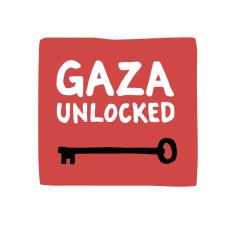Since his return to the Gaza Strip following his national speaking tour in the US, Palestinian writer and activist, Ahmed Abu Artema has appeared twice in events in Gaza about the tour.

Since his return to the Gaza Strip following his national speaking tour in the US, Palestinian writer and activist, Ahmed Abu Artema has appeared twice in events in Gaza about the tour. The moment Abu Artema arrived in the United States in January, many in Palestinian activist and political circles have been curious to hear about his experience. It is rare for Palestinians from the Gaza Strip to travel abroad, especially to the U.S., for extended periods of time. The Gaza Strip is under a strict Israeli blockade that limits the freedom of movement of people, goods, medical supplies, as well as exports and imports.
In the past two weeks, Ahmed Abu Artema he has spoken with two youth groups in recent weeks, most recently with Jusoor for International Communication, a Gaza-based youth group that works on building bridges between Palestinians in Gaza and the outside world.
In his talk, entitled “Palestinian and the American Society: a Personal Experience,” Abu Artema gave a summary of his experiences traveling in the U.S.. He told the story of how the tour started as a wishful idea of staff at the American Friends Service Committee (AFSC), then became a reality nearly 6 months later . He spoke about the histories and experiences of African American, Native, Latino, and Palestinian communities struggling for justice and equality in the U.S. He provided a brief overview of AFSC and Quaker activism for justice in the U.S. that he learned by visiting AFSC offices in Chicago, California, New Mexico, New York, Washington, DC, and Atlanta.
The tour was an opportunity to build the human and personal connections that the blockade prevents. When people meet in person, they become capable of making human connections, defying stereotypes and generalizations, Abu Artema explained. One highlight of the tour for Abu Artema was his interaction with progressive Jewish Americans who support Palestinian rights. He reflected on his experiences speaking to members of Jewish communities in various cities, citing the intergenerational and political shifts taking place in these communities vis-à-vis Palestine and Israel. He reflected on these interactions as an example of how building such connections can create better understanding between communities.
“I knew about groups such as AFSC and Jewish Voice for Peace and the work they do but I couldn’t imagine the scale of the change happening in the U.S. as a result of their work,” he said. “We need to reach out to people with a humane discourse that emphasizes rights and justice,” Abu Artema said. Regarding discourse, Abu Artema highlighted the importance of adopting a discourse that centers justice for all people. He addressed how an issue like the Holocaust is talked about by certain people in Palestine, saying that there is no point in denying that such an brutal event happened, and that understanding history helps furthering the Palestinian case for justice. “We condemn such crimes because this is what our faith and values teach us,” Abu Artema explained to his Gaza audience, saying also that in response to questions by supporters of Israel, his answer was that “one cannot solve a past injustice by creating an injustice in the present.”
The event in which Ahmed spoke was attended by academics, activists, and students and was held at the Palestinian Red Crescent hall, a major venue for cultural and political activities in the universities area in the heart of Gaza City.
View Ahmed's talk here (the talk is only available in Arabic).

